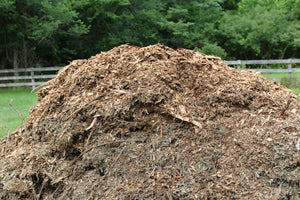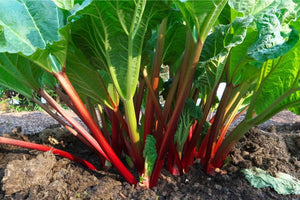When to Plant and How to Grow Tender Zucchini and Summer Squash
ZucchiniZucchini is well known as a prolific producer. Many beginner gardeners have great success growing zucchini. However, while producing baseball bat-size zucchini is entertaining, it’s not that delicious. To have a zucchini and summer squash harvest that’s tender and tastes good, you need to know when to pick zucchini.

Zucchini are in the same growing category as other summer squash. So the growing tips we cover here will also apply to our Straightneck and Patty-pan summer squashes.
When to Plant Zucchini and Summer Squash
Zucchini and summer squash are warm-weather crops. They don’t tolerate cold temperatures at all. Wait to plant zucchini until all danger of frost is past and the soil temperature is at least 65ºF.
May is a good time to plant zucchini and summer squash in many North American locations. You can also plant again in June for an additional harvest.

How to Grow Zucchini from Seed
- Start with nutrient-rich soil. Zucchini plants are fast-growing and heavy feeders. They benefit from soil with lots of compost and may even need additional fertilizing as they are setting fruit.
- Zucchini and squash seeds are large enough to easily plant without crowding.
- Sow the zucchini seeds 1 inch deep and cover with soil.
- Keep the seeds moist until they sprout in 7 to 14 days.
- You can plant 2 to 3 seeds per space and then thin to 1 plant per 2 feet. At first, this may seem like a lot of space between seeds, but zucchini plants grow big fast.
Tips for starting summer squash and zucchini seeds indoors
- If you want to start zucchini seeds indoors, plant them in large enough pots that they don’t become root bound before transplanting outside.
- Sow zucchini seeds 3 to 4 weeks before the last spring frost.
- Plant zucchini seeds ½ inch deep and keep them moist until they sprout.
- Harden off zucchini seedlings before transplanting them outdoors.

How to Grow Zucchini Plants
Sun
Summer squash and zucchini plants need full sun. They thrive in hot summer temperatures and will use all that sunshine to produce fruit.
Soil
Give squash plants nutrient-rich soil that drains well. Amend the soil before planting with plenty of compost.
Water
Zucchini plants need lots of water to grow all those heavy fruits. Consistent watering is also vital for healthy plants. You can add a layer of mulch to keep the soil from drying out too quickly. When the summer days get hot and dry, you may need to water more frequently than once a week.
Plant Spacing
Zucchini plants can get very large. Give each plant enough room to grow. If growing vertically on a trellis, they can be closer together. The recommended space for zucchini plants is 18 to 36 inches.
Fertilizer
More is not better with fertilizer. Start with nutrient-rich soil, and when the plants start setting fruit, an additional application of compost or a slow-release fertilizer can help the plants grow more produce.
Pollination
Zucchini flowers need to be pollinated to develop fruits. Each zucchini plant will develop male and female flowers. The male flowers will fall off after a few days. If you have female flowers falling off, it is usually because they are not getting pollinated. If this happens, you will need to hand pollinate.

Solutions for Zucchini Pests and Diseases
Squash bugs and vine borers are the two main pests to watch for. You can use mesh row covers to keep bugs out when plants are young. Row covers can also protect seeds and tender seedlings from being eaten by other critters. Just remember to remove the covers so pollinators can get to the squash flowers.
To control pests, start by looking under squash leaves for eggs. Then, remove the eggs and drown them in soapy water.
Duct tape also works well to lift off eggs and bugs from leaves.
Companion planting is a natural way to reduce pests in the garden. For example, a University of Iowa study found that zucchini interplanted with marigolds had less damage from cucumber beetles and squash bugs. Nasturtiums are another excellent companion plant for zucchini and summer squash.
Companion planting zucchini with flowers does double duty because the flowers will also attract more pollinators to your garden.
Heirloom Summer Squash Zucchini Varieties
How to Harvest Tender Zucchini and Summer Squash
Knowing when to harvest is critical to enjoying tender zucchini that tastes good.
Picking your summer squash at the right time makes all the difference. These fruits can keep growing and get enormous. But bigger isn’t better. Zucchini is much tastier when it's young and tender.
You can start harvesting zucchini and summer squash when they are around 5 inches. Usually, about 8 to 10 inches long is as long as you want them to be.
Zucchini and summer squash develop tough skin and big seeds when left too long on the vine.
Harvesting zucchini often will encourage more production, and you’ll continue to have an abundant harvest.
You can also eat the squash blossoms. Try frying some up and serving them with other fresh garden produce.
Zucchini bread is another delicious way to enjoy your harvest. Try our zucchini bread recipe.

Zucchini FAQs
Can you grow zucchini in containers?
Bush varieties of summer squash and zucchini can be grown in containers. Try our straight-neck summer squash and cocozelle zucchini for container growing.
How can I grow zucchini in a small space?
Do you have a small garden, or don’t want your squash taking over everything else? Try growing zucchini on a trellis to save space.
Zucchini plants don’t have tendrils like other vining plants, but they can be anchored to the trellis as they grow if you start when they are first growing.
Growing vertically works well as long as you support the plants. Slings can hold the weight of heavy fruits.
What are good companion plants for zucchini?
Flowers are an excellent companion plant for zucchini. You need pollinators to visit your garden, and flowers will help draw them in. Marigolds and nasturtiums are especially helpful for deterring squash pests.
Peas and beans are great companion plants because they add nitrogen to the soil. You can plant peas in the spring, and then when temperatures get too hot, remove the peas and plant your zucchini.

Zucchini is easy to grow from seed and a great choice for home gardens. They are such a reliable producer that you’ll surely have plenty of zucchini for all your favorite recipes. And if you run out of delicious ways to use your homegrown zucchini, use our favorite method. Donate fresh garden produce to your local food pantry. People without access to a garden will appreciate these fresh summer squash.
Happy growing!






Leave a comment